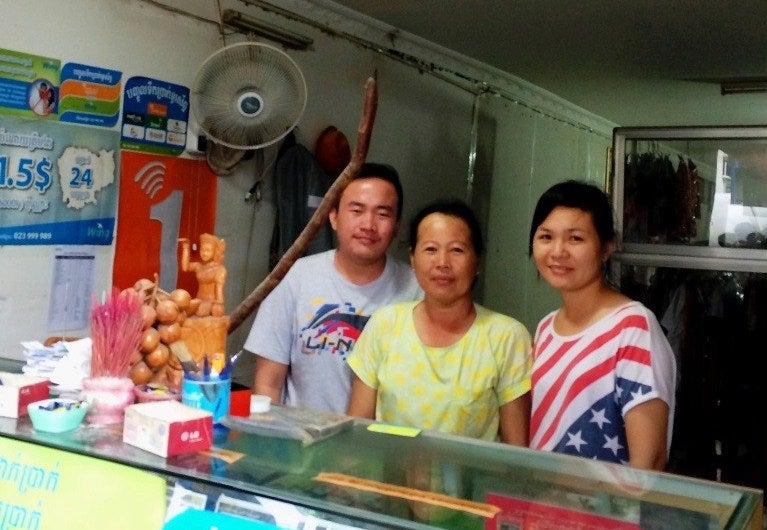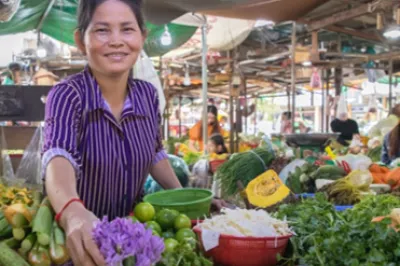Wing Pushes Digital Finance Frontiers Further in Cambodia
The shift from traditional microfinance and banking to digital is easy to see in Cambodia. All the market leaders such as ACLEDA Bank, AMK, and AMRET are increasingly using technology and agents to serve their customers.
A few weeks ago, Wing, a leading third-party payments provider in Cambodia, obtained a specialized bank license from the National Bank of Cambodia (NBC). With $4.5 billion in transaction volume in 2014, and an estimated 1.5 million customers (in a country of 15 million inhabitants), Wing has become a leading player in financial inclusion in Cambodia. Wing has one million over-the-counter (OTC) customers and about 500,000 registered customers who can make transactions with cards or mobile phone either in Riel or in dollars. The average transaction size is at $110. In comparison, the microfinance sector in Cambodia has about two million borrowers and 2.3 million depositors. These figures reflect considerable penetration of microfinance and increasingly of digital payments as well. According to Wing, 67% of its customers are rural and 37% are women.
The announcement of Wing’s new specialized bank is groundbreaking. In other countries, we see increasing collaboration between Mobile Network Operators or payment providers and banks to broaden the product offering to low income such as for M-Shwari in Kenya. In contrast, Wing hopes to use its specialized bank license to offer a wider range of services beyond payments. It will be interesting to see what kind of advantages the new license will bring Wing customers as well as for its business model and how it might affect the traditional banking and microfinance sector.

Photo Credit: Eric Duflos
According to Wing CEO, from a customer perspective, the new license would enable those registered customers to get some interest on the balance they hold on their Wing account. Customers will get 1% per annum which is more than most banks and MFIs pay on deposits. As for credit so far Wing has only provided airtime credits to its customers so that they can automatically top up when they run out of airtime. Wing also intends to provide credit lines to its agents who usually borrow to manage liquidity (20% of their agents currently borrow money for such purpose). Wing will also develop international remittance services for Cambodians working abroad who want to remit funds home.
For Wing’s everyday business, the new license means that they are now fully accountable to the NBC, and fully independent from ANZ, the Australia and New Zealand Banking Group. Wing expects to get significant income from the e-float deposited in banks, which was not the case when Wing was related with ANZ. It could also mean Wing would be able to develop new products with more agility, which is important in an increasingly competitive environment. Metfone has just received a third-party payment processor licenses, and others are expected to follow. These new players could compete for Wing’s agents in the future. Wing’s independence from ANZ will bring opportunities for new partnerships with other players. For example Wing plans to share its 2,500 agents with MFIs for loan repayment and with banks for cash withdrawal. Wing is already collaborating with eight MFIs on loan repayment collection.
But the license also raises challenges for Wing and for the financial inclusion industry at large. Being a bank is a different business from being a third party payment processor. The new reporting and supervision requirements from the National Bank of Cambodia may not always be easy to manage. It will also directly report to the Financial Intelligence Unit on AML/CFT issues. Wing will need to acquire new skills and new staff which will take time and resources.
This situation may also create challenges for NBC as it will also require new regulations and staff with the skills to supervise in areas such as safeguarding e-float and protecting customers. It is indeed crucial in such a fast evolving environment to ensure good protection of low-income customers’ money. The NBC is well aware of the issue.
Finally, the license raises questions for the traditional financial inclusion providers. Will the license force a bigger change across the traditional banking sectors where players may feel the need to compete with all things Wing does? Or is the Wing effort likely to lead to greater specialization by different players where Wing and similar organizations build partnerships with other institutions to deliver services? Do-it-alone or do it through partnerships? This question is even more relevant since Wing also hopes to get a full bank license in the coming years.
All in all, there is no doubt that 2015 is going to be a very interesting year for Wing, but also for the entire industry in Cambodia which is entering digital finance at great speed.




Comments
Great article Eric, and
Great article Eric, and delighted to see the success story WING has become in Cambodia, particularly in terms of the impact on rural and female customers. There are many people in the 'WING alumni' who know the struggle since 2008 to get the company to this point, and I am sure they all share my delight in reading blogs such as this. Well done to the shareholders of WING, CEO Anthony Perkins and management and staff! The new direction of a specialised banking license will provide the industry with a very interesting test case of how this pivot can be successful.
Add new comment